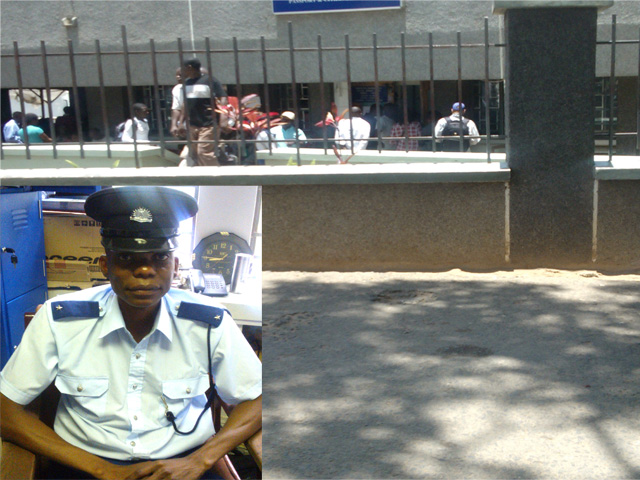Malawi launched the world’s first malaria vaccine on Tuesday in landmark pilot programme.

The country is the first of three in Africa in which the vaccine, known as RTS,S, will be made available to children up to two years of age; Ghana and Kenya will introduce the vaccine in the coming weeks.
Government officials were joined by officials from partner officials as they witnessed the vaccination of the initial recipients at Mitundu Health Centre 45 kilometres west of Lilongwe.
According to a statement released by the World Health Organisation on the sidelines of the vaccine launch, malaria remains one of the world’s leading killers, claiming the life of one child every two minutes.
“Most of these deaths are in Africa, where more than 250,000 children die from the disease every year. Children under 5 are at greatest risk of its life-threatening complications. Worldwide, malaria kills 435,000 people a year, most of them children,” it reads.
Michael Kayange, deputy director in the ministry of health responsible for malaria told said that while the vaccine is not bulletproof, it is an additional tool to the control of malaria.
“We have several strategies that we use for the control of malaria in this country. And of these tools, no does it all. So even this new vaccine, it doesn’t do it all. The tools work to compliment each other.
“This new vaccination is a new tool to the control and elimination of malaria in this country. So, all the children that will get this vaccine, we encourage them to still use other malaria prevention measures
“This vaccine is important to Malawi because we have WHO-approved interventions but these have proved inadequate which is why we are looking for new tools. This is one additional tool that will help us control malaria in this country and it has the potential of saving so many lives,” he said.
Kayange said, once rolled out, the vaccine has the capacity of preventing one million of the six million malaria cases that are reported annually in Malawi aside from preventing 4,000 deaths.
“So, this vaccine is a huge plus to Malawi,” he said.
Temwa Mzengeza, programme manager for Malawi’s expanded programme on immunization said the pilot programme is being implemented in 11 of Malawi’s 28 districts.
“We will do this pilot for 30 months and we are expecting to be vaccinating 120,000 children per year after which we may roll out to all districts and the whole country.
“This vaccine is preventing at least four of the 10 episodes in a child. It may not seem very high, but remember this is just an additional tool. Which is why we are encouraging the communities to continue using other preventive measures as we roll out this vaccine,” she said.
Mervis Kuyeri, whose five-month old child received a dose of the vaccine said she decided to take part in the pilot phase due as it promises to prevent the child from malaria.
“This vaccine is vital for the growth of the child because it will ensure that she will not suffer from malaria, which has killed a lot of people in my community,” she said.
In a statement, WHO Director-General Dr Tedros Adhanom Ghebreyesus said the malaria vaccine has the potential to save tens of thousands of children’s lives.
“We have seen tremendous gains from bed nets and other measures to control malaria in the last 15 years, but progress has stalled and even reversed in some areas. We need new solutions to get the malaria response back on track, and this vaccine gives us a promising tool to get there,” he said.
Thirty years in the making, RTS,S is the first, and to date the only, vaccine that has demonstrated it can significantly reduce malaria in children. In clinical trials, the vaccine was found to prevent approximately 4 in 10 malaria cases, including 3 in 10 cases of life-threatening severe malaria.
“Malaria is a constant threat in the African communities where this vaccine will be given. The poorest children suffer the most and are at highest risk of death,” said Dr Matshidiso Moeti, WHO Regional Director for Africa.
“We know the power of vaccines to prevent killer diseases and reach children, including those who may not have immediate access to the doctors, nurses and health facilities they need to save them when severe illness comes.”
“This is a day to celebrate as we begin to learn more about what this tool can do to change the trajectory of malaria through childhood vaccination,” she added.
The pilot programme is designed to generate evidence and experience to inform WHO policy recommendations on the broader use of the RTS,S malaria vaccine. It will look at reductions in child deaths; vaccine uptake, including whether parents bring their children on time for the four required doses; and vaccine safety in the context of routine use.
The vaccine is a complementary malaria control tool – to be added to the core package of WHO-recommended measures for malaria prevention, including the routine use of insecticide-treated bed nets, indoor spraying with insecticides, and the timely use of malaria testing and treatment.

.jpeg&w=60&q=100&h=60)




.jpeg&w=60&q=100&h=60)





